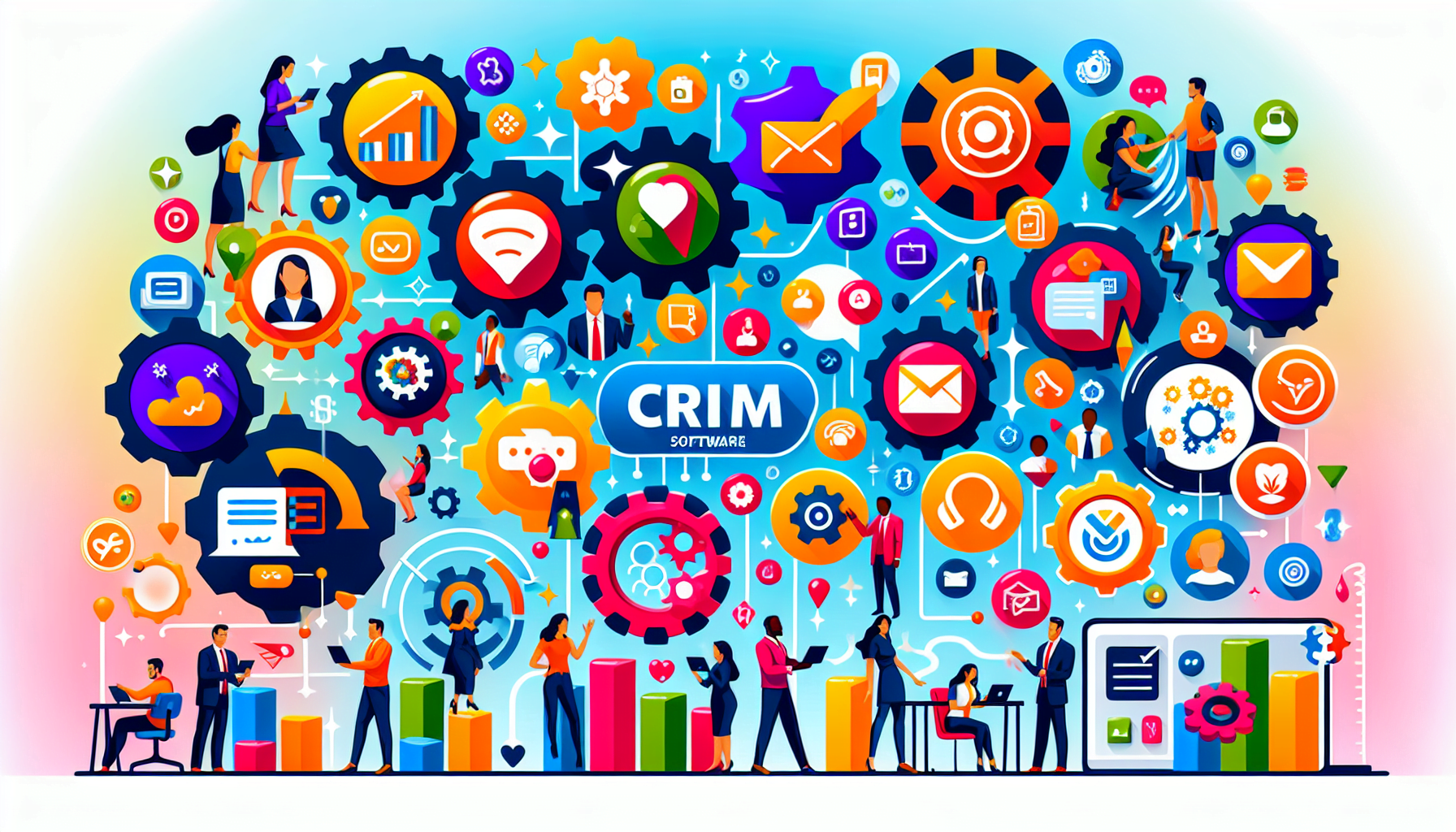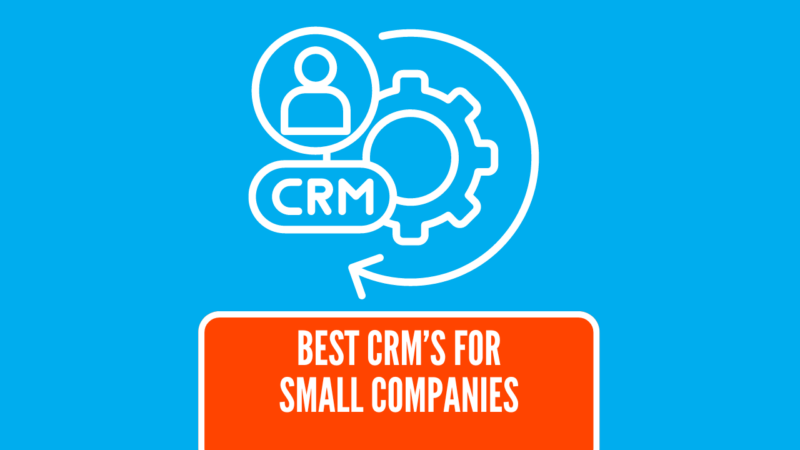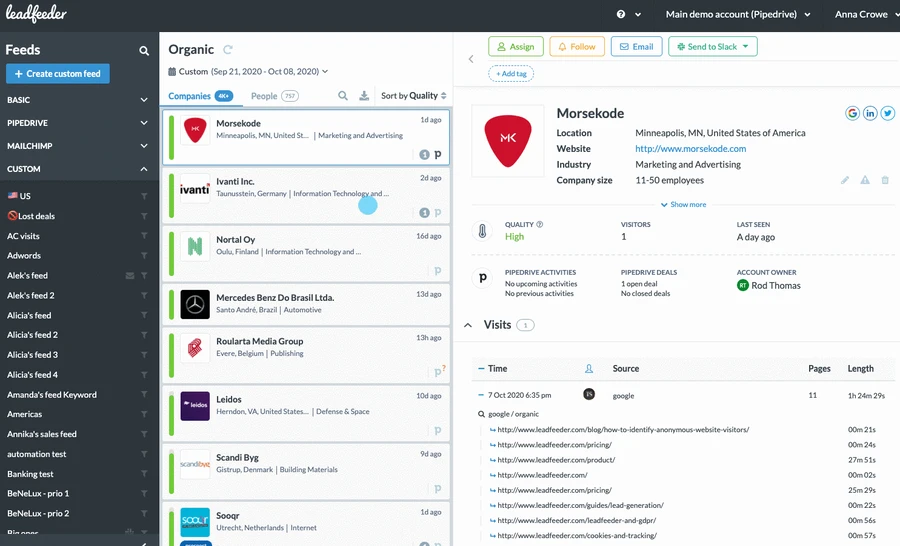Are you in search of a CRM designed with your small business in mind? A good CRM for small businesses can make managing customers easier, boost productivity, and foster expansion. This article delves into the best 10 CRMs for small companies in 2024, highlighting functionalities that are particularly beneficial to the needs of smaller enterprises. Learn how these solutions could align with your specific requirements.
Key Takeaways
Small businesses need CRM software to streamline operations, enhance customer relationships, and ensure data security.
Key features of effective CRM systems include contact management, interaction tracking, automation, and customization to fit unique business needs.
Choosing the right CRM involves assessing specific needs, setting a budget, ensuring user-friendliness, and incorporating feedback from users.
Why Small Businesses Need CRM Software

The CRM software market is rapidly expanding, indicating a growing recognition of its importance among businesses, including small enterprises. This boom isn’t just a trend; it’s a testament to how invaluable CRM systems have become for businesses aiming to streamline their operations and bolster customer relationships.
A user-friendly and intuitive CRM system is essential for small businesses. The right CRM simplifies workflows rather than complicating them. Picture a tool that organizes contacts, tracks interactions, and automates follow-ups. This efficiency is particularly important for small businesses, allowing time saved to be directed towards growth and innovation.
Data security and compliance with regulations like GDPR are crucial when choosing a CRM system. Protecting customer data is vital for maintaining trust and peace of mind. A robust CRM securely stores and manages sensitive information, meeting regulatory requirements and safeguarding against breaches.
In summary, small businesses need CRM software to stay competitive, streamline their operations, and secure their data. A well-chosen CRM can transform business processes, making everyday tasks more manageable and efficient.
Key Features of Small Business CRM Software
CRM software serves as the backbone for efficient contact management, particularly crucial for small businesses. It’s essential to keep a comprehensive and up-to-date database of customer information readily accessible, which helps ensure all customer interactions are captured without fail.
Incorporating the tracking of customer interactions into this data provides depth and insight, allowing companies to better grasp client demands and inclinations. Such enriched understanding is key in honing relationship management strategies that yield more personalized and fruitful communications with customers.
For smaller enterprises, workflow automation embedded within CRM systems can be transformative in boosting efficiency. By automating follow-up tasks associated with various customer touchpoints (such as setting reminders or logging communication activities like calls or emails), valuable time is freed up from routine tasks towards more impactful business endeavors.
The ability to customize these tools cannot be overstated. Each small business operates distinctively with its own set of processes. A CRM system flexible enough to offer customized dashboards or specialized reports enables alignment with specific operational needs rather than forcing conformity on your part.
Ultimately, top-tier CRM software for small businesses synergizes excellent contact management capabilities with interaction insights, robust automation functions, and extensive customization options. These fundamental components form an effective ecosystem supporting sustained commercial expansion by nurturing stronger bonds between a company and its customers.
Benefits of Using CRM for Small Businesses

CRM platforms streamline customer interactions and task automation, greatly increasing efficiency for small businesses. By centralizing customer data, they create a unified source of truth that ensures consistent information access across the organization. This uniformity promotes better decision-making and fosters an aligned strategy in managing customers with the CRM system.
Leveraging a CRM significantly boosts customer retention by managing relationships adeptly and swiftly resolving issues, which cultivates stronger loyalty among clients. The ability to track all customer interactions deepens understanding of client needs, leading to improved satisfaction and higher rates of retention.
In lead management, CRMs are pivotal as they alert team members about optimal times for outreach to potential clients, thereby ensuring no prospects slip through the cracks. Such timely engagements can transform leads into devoted patrons who contribute positively to business expansion.
Sales report automation is another considerable benefit provided by CRMs. They support teams in efficiently monitoring performance metrics and controlling sales pipelines more effectively—automating these processes saves valuable time while offering insights that enhance sales strategies’ refinement.
CRMs enable finer segmentation of customers within small businesses, allowing precise targeting specific demographics or interest groups. With analytics integrated within CRM systems, marketing teams gain essential feedback on campaign effectiveness, enabling them to fine-tune future endeavors. A robust CRM thus stands as critical tool for any small business eager to pursue substantial growth.
Top 10 Small Company CRM Solutions for 2024

Choosing the right CRM solution from the plethora of options can be daunting. Here is a handpicked list of top 10 CRM solutions for small businesses in 2024, each with distinctive features to cater to diverse business requirements.
HubSpot’s Free CRM: HubSpot’s no-cost offering shines with an intuitive interface that includes email tracking and live chat capabilities. It is an excellent option for small businesses beginning their journey with CRMs, providing robust yet user-friendly tools.
Insightly With its adoption by over 350,000 companies, Insightly provides seamless integration with emails and social networks. Its uncomplicated design combined with extensive CRM functionalities makes it popular among small businesses aiming to enhance efficiency.
Nimble excels at improving contact management and monitoring activities by automatically linking contacts’ social media accounts—offering a complete snapshot of customer engagements which aids more effective interaction strategies.
Tailored for SMEs (small to medium enterprises), Vtiger delivers cloud-based flexibility including tailored reports and lead management systems – perfect for those seeking customization aligned closely with specific operational demands.
Zoho CRM Renowned for flexible adaptation abilities, Zoho allows users effortless creation of dashboards as well as leads tracking, making it ideal for firms needing high configuration within their chosen system.
Despite limited integrations outside its ecosystem, Salesforce presents a cost-effective starter version equipped with standard customizability packaged within a straightforward platform. Directed at organizations searching for reliable introductory level software.
Freshsales CRM: Featuring broad tailoring potential alongside AI-enabled efficiencies, this solution cuts through complexity. Might fall short due to price-tagged advanced reporting functions omitted in free variants potentially deterring some ventures.
Less AnnoyingCRM: As suggested, named economical variant offers comprehensive aid albeit sacrificing intricate report competencies suiting entities desiring plain sailing operative flow without unnecessary embellishment or complications edges platforms.
Showcasing modern adaptable layouts complemented automated process mechanisms Monday navigates around perplex pricing models standing firm solid choice esteem aesthetically inclined flexibly minded venture circles.
Pipedrive Provides straightforward experience optimized team workflow handling specialising sales pipeline navigation may find offerings light compared against charge scales concerned quarters.
When selecting these tools, it is critical to consider provider backing benefits hands-on trial experiences Each listed solution brings spectrum attributes budget alignments permitting varied scales enterprise secure optimal resource alignment.
How to Choose the Best CRM Software for Your Small Business
Initiating the search for the best CRM software requires a thorough needs assessment tailored to your small business. Pinpoint essential functionalities like lead tracking, automation, and customization that align with your company’s aims. This step aids in filtering out CRMs that don’t meet those specific objectives.
Establishing a budget is imperative when selecting a CRM system since costs can fluctuate based on factors such as number of users, deployment models, and extra capabilities. Recognizing fiscal limitations helps guarantee you pick a CRM offering optimal value while keeping within financial bounds.
A user-friendly interface is paramount in any CRM solution to ensure swift adoption and effective use by staff members. An intuitive design minimizes training time so employees can begin reaping the benefits of the system right away.
Soliciting input from individuals who will be using the system delivers critical perspectives about its practicability and performance throughout various sectors of your business. Such feedback alerts you to possible hurdles promptly and confirms if all user requisites are fulfilled by your chosen best crm software.
Affordable CRM Options for Small Businesses

The Salesforce Starter package presents a CRM solution tailored for small businesses, offering both an intuitive interface and customization flexibility. It’s more cost-effective than many alternatives, but its integration with third-party services is somewhat restricted. This makes it well-suited to smaller enterprises in need of a foundational CRM that can scale as they do.
For small businesses prioritizing ease-of-use, Freshsales CRM delivers by combining deep customization options with an AI-powered assistant designed to optimize operations. Its complimentary version comes short on reporting tools, which could be seen as a limitation by some users.
With Less Annoying CRM, there is an emphasis on affordability paired with strong customer support within its singular pricing plan. Although it provides limited reporting functions. Small business owners who prefer straightforward and uncomplicated CRMs will appreciate this option’s basic yet effective features.
On the affordable end of feature-rich solutions lies Vtiger – noted not only for its budget-friendly but also for useful functionalities such as seamless email syncing and attentive customer assistance. Despite potential challenges navigating through its complex interfaces, it stands out as a solid choice for firms seeking comprehensive features in their CRM without substantial financial investment.
Integrating CRM with Other Business Tools
Integration capabilities with other software are important for a cohesive customer relationship management experience. Connecting CRM systems with other tools enhances business processes and provides a unified view of customer interactions.
Utilizing APIs is a common approach for linking CRMs with other software, allowing for tailored connections. Many CRM platforms come with pre-built integrations for popular applications, simplifying the integration process.
Employing connector software like Zapier can bridge your CRM with various third-party applications without requiring coding skills. This makes it easier for small businesses to create a seamless workflow.
Monitoring key metrics, such as conversion rates and engagement, is essential when integrating CRM with web analytics tools. Integration of additional communication tools with the CRM can enhance workflow and data sharing among the sales team.
Maximizing CRM Capabilities for Sales Teams
Customer Relationship Management (CRM) systems have the capacity to optimize the sales process by automating critical tasks, which may lead to an uptick in productivity and sales figures. CRMs offer automation features that facilitate task management such as recording activities and issuing alerts efficiently. Enhancing CRM utilization can be achieved through simplifying entry processes, tailoring views for users’ needs, and establishing presets that reduce repetitive input.
To drive home the significance of a robust CRM system for improving aspects like visibility in sales data, forecasting accuracy, and fostering teamwork among members. It is imperative for leaders in sales to exemplify its use actively as part of best practices while underscoring its benefits within their ranks. Continuous educational sessions coupled with support mechanisms play a pivotal role in ensuring the proficiency of a sales team when wielding these instrumental tools.
Incentive schemes can serve as powerful stimuli encouraging individuals on teams specializing in sales to diligently document their interactions within the CRM framework consistently.Hailed for both prompting users regarding follow-ups with contacts and offering superior functionality for annotating details, Capsule CRM shines brightly especially in smaller scale settings regarding teams of sellers.Pipedrive’s renown stems from its user-friendly interface paired with adeptness in managing workflows, but does encounter limitations given its cost structure when evaluated against provided features.
Enhancing Customer Service with CRM Systems
The adoption of a CRM system can improve customer service by ensuring that employees have ready access to critical customer information. A unified database makes it easier for staff across the company to retrieve client details.
CRM systems contribute to improved internal communication by offering insights into clients’ engagements with different team members. Such transparency promotes collaborative efforts and enhances the personalization of communications with customers.
By syncing CRM systems with customer support platforms, routine support tasks become automated, enriching the personalization aspect of client interactions. With a complete history of past interactions at their fingertips, customer service teams are equipped to deliver prompt and effective solutions. CRMs come equipped with automatic notifications and reminders that streamline the management process concerning scheduling and subsequent follow-ups with customers.
Boosting Marketing Efforts with CRM

The capabilities for customer segmentation in CRM systems empower companies to customize their outreach and marketing strategies according to particular characteristics. By segmenting customer data effectively, businesses can craft more targeted marketing campaigns and deliver a more concentrated approach to customer service.
By leveraging the analytical power of CRM systems over collected customer data, businesses are able to execute personalized marketing initiatives. When these CRMs are coupled with email marketing solutions, they enable the automation of these efforts while providing insights into campaign effectiveness. Utilizing such integrations allows businesses to refine their marketing campaigns using detailed segmentation based on available consumer information.
CRM tools facilitate an increase in efficiency for automated communications within marketing automation by reducing the need for manual intervention. These tools provide extensive tracking of customer interactions across multiple channels which enriches understanding concerning how customers interact throughout their purchasing journey.
Summary
To sum up, for small businesses intent on bolstering their efficiency, fostering better customer relationships, and stimulating expansion, the adoption of CRM software is crucial. Selecting an appropriate CRM system, coupling it effectively with existing business tools, and harnessing its capabilities to the fullest within sales and marketing departments can propel small enterprises toward unprecedented productivity and heightened levels of customer satisfaction. Embrace the transformative impact of CRM to revolutionize your business operations.
Frequently Asked Questions
Why do small businesses need CRM software?
CRM software is essential for small businesses to enhance efficiency and fortify customer relationships through the consolidation of data and optimization of workflows. It facilitates improved decision-making while simultaneously bolstering data security and adherence to regulatory standards.
What are the key features of small business CRM software?
CRM software for small businesses is designed to proficiently manage contacts, track customer interactions, offer automation features, and provide customization possibilities.
Utilizing these functionalities enables you to enhance your communication with customers and make your business processes more efficient.
How can CRM software benefit small businesses?
CRM software is a powerful tool that enhances the efficiency of small businesses by automating tasks and optimizing customer interactions.
This type of software supports increased customer retention by offering a unified database, which also delivers crucial insights to inform smarter business decisions.
What are some affordable CRM options for small businesses?
Should you be in the market for an affordable CRM solution, take into account options such as Salesforce Starter, Freshsales CRM, Less Annoying CRM, or Vtiger.
Each of these provides valuable functionalities while ensuring your finances remain intact!
How can integrating CRM with other business tools help small businesses?
Integrating CRM with other business tools can really streamline your operations by creating a unified view of customer interactions and automating workflows. This not only boosts efficiency but also helps you track important metrics effortlessly, making it a smart move for small businesses.



